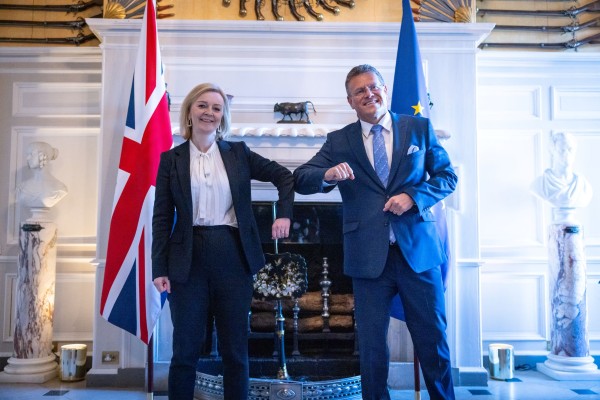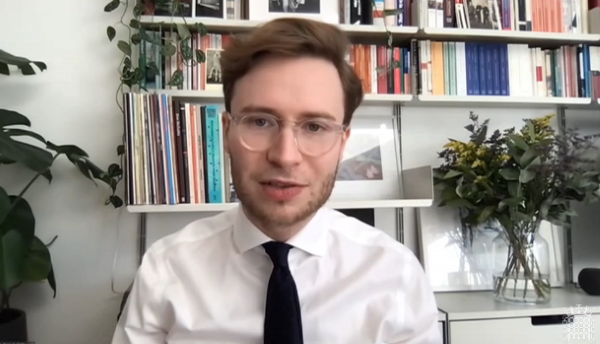Brexit & Beyond Newsletter
24 January 2022
 Welcome to the 24 January 2022 Brexit & Beyond newsletter
Welcome to the 24 January 2022 Brexit & Beyond newsletter
Liz Truss and Maroš Šefčovič meet in Brussels today to take stock of ongoing negotiations on the Protocol on Ireland/Northern Ireland. The role of the European Court of Justice in the Protocol has been discussed in the Lords. In the Commons, the NI Affairs Committee took evidence on investment in Northern Ireland. The Lords Common Frameworks Scrutiny Committee has raised concerns about the Common Frameworks programme in relation to Northern Ireland and Protocol matters.
EU-UK negotiations
Today, UK Foreign Secretary Liz Truss and European Commission Vice-President Maroš Šefčovič meet in Brussels for further talks on the Protocol on Ireland/Northern Ireland. Last week they held a phone call to prepare for today’s meeting. Šefčovič tweeted, “We need to press on towards practical solutions within the IE/NI Protocol: facilitating its implementation on the ground, while safeguarding the integrity of the EU's Single Market”. In an article in the Belfast Telegraph, Truss writes that the Protocol “is failing on its own terms – having lost the consent of the Unionist community over fears their identity – along with the integrity of our country – are under threat.” Truss concludes that there is a “deal to be done” and says, “for a solution to stand the test of time, it needs to fix the Protocol comprehensively rather than rely on piecemeal solutions to problems as they arise.”
 UK Foreign Secretary Liz Truss and European Commission Vice-President Maroš Šefčovič during their recent meeting at Chevening | Source: European Union, 2022.
UK Foreign Secretary Liz Truss and European Commission Vice-President Maroš Šefčovič during their recent meeting at Chevening | Source: European Union, 2022.
RTÉ reports that Šefčovič briefed members of the European Parliament last week; he signalled that negotiations could wrap up by the end of February if there is no breakthrough, as the NI election campaign period will begin in March. On 19 January, in a speech to the European Parliament, French President Emmanuel Macron said the UK Government needs “to comply in good faith with the agreements concluded with our Union…that applies to the implementation of the Northern Ireland Protocol, and to the rights of our fishers…that is the requirement if we are to remain friends.” Šefčovič also addressed the Parliament, saying, “The United Kingdom are our neighbours, our allies, and I think all of us in this House would like to see them again as our strategic partners. For that to happen, we need to rebuild the trust, and trust is built by respecting our Agreements.”
The European Court of Justice and the Protocol
In Liz Truss’ article in the Belfast Telegraph, she writes, “We must end the role of the European Court of Justice as the final arbiter of disputes and revert to the same rules as found in other international treaties.” The role of the Court of Justice of the European Union in relation to the Protocol was discussed at the Lords Sub-Committee on the Protocol on Ireland/Northern Ireland on Thursday. Martin Howe QC told the Committee that it is contrary to international treaty practice for one party to have their own domestic courts binding on the other. Anton Spisak of the Tony Blair Institute said the dispute resolution mechanism in the Protocol is “unusual” but highlighted that the Withdrawal Agreement and Protocol are highly unusual in themselves. Professor Catherine Barnard, Professor of European and Employment Law at University of Cambridge, explained that the EU perspective is that these are EU rules so it’s the EU court which has oversight. She highlighted that the Protocol text relies on large tracts of EU law and the EU would say that only its court can have the final say on the interpretation of that. She suggested one could argue that from the point of view of producers in NI, it is a good thing to have access to the ECJ: if they are bound by EU rules, they should have the means to challenge them.
Barnard suggested that the UK Government’s position has evolved somewhat, and it appears to have moved away from arguing for ‘no role whatsoever’ for the Court, to a more residual role. On a possible landing zone in the ongoing negotiations, Barnard and Spisak agreed that the only way forward is to apply the Part Six mechanism for dispute resolution to the Withdrawal Agreement as a whole, including the Protocol. Howe suggested the current provisions could be replaced with the Trade and Cooperation Agreement arbitration mechanism, but argued that what “needs to be tackled more fundamentally” is the obligation to maintain laws in NI identical to those in the EU. He proposed mutual enforcement as a possible remedy.
 Anton Spisak, Policy Lead for Trade and Productivity at the Tony Blair Institute | Source: UK Parliament
Anton Spisak, Policy Lead for Trade and Productivity at the Tony Blair Institute | Source: UK Parliament
The session also discussed how the ECJ may interpret EU case law with regard to Northern Ireland in the future, the democratic deficit, subsidy control provisions, the EU’s mandate from member states, and Article 16 in relation to domestic law.
Scrutiny of the Protocol
Lord Jay, Chair of the Lords Sub-Committee on the Protocol on Ireland/Northern Ireland has written to Foreign Secretary Liz Truss regarding the Committee’s scrutiny of new or amended EU legislation which falls within the scope of the Protocol. Since the Committee was established, it has written over 80 letters to Government Ministers, and has received over 50 replies, on 40 separate EU legislative proposals applying (or potentially applying) to Northern Ireland under the Protocol. The Committee's correspondence is compiled here. Lord Jay notes that this work “has added significance in the post-Brexit context, given that such legislation applies to Northern Ireland without UK participation in the EU institutions, or the prior consent either of the UK Government or the Northern Ireland Executive.” The Committee is critical of the quality and consistency of the UK Government’s Explanatory Memorandum (EMs) and responses on EU legislation applying to NI under the Protocol.
Investment in Northern Ireland
The Commons Northern Ireland Affairs Committee continues its inquiry on investment in Northern Ireland. Last week, Philip McBride, Belfast Managing Director of Thales UK, highlighted to the Committee that regulatory issues between the UK and Northern Ireland under the Protocol are causing problems: “If rules diverge further, that will have an impact, so regulatory commonality between Northern Ireland and GB is becoming more and more important to our industry.”
Professor Emma Flynn, Pro-Vice-Chancellor (Research and Enterprise) at Queen’s University Belfast pointed out that around 15% - 20% of the university’s Research and Development income comes from the EU and the university’s association with Horizon Europe - the potential loss of part of their research budget is a concern. Horizon Europe is the EU’s key funding programme for research and innovation with a budget of €95.5 billion. The UK has associate membership of the EU programme, but that membership hasn’t yet been ratified.
In relation to issues around the Protocol, Dr Robert Grundy, Chair of Matrix, The Northern Ireland Science Industry Panel, said, “There are elements of Brexit that need smoothed off, in terms of the rough edges. There are elements that are absolutely prime to exploit from a Northern Ireland perspective. If we can bring them in line as well, we are in a great place. The potential for Northern Ireland is huge, if we get behind the right areas.”
Common Frameworks
The Lords Common Frameworks Scrutiny Committee has written to UK Minister Neil O’Brien, who oversees the Frameworks programme, regarding Northern Ireland and Protocol matters. The Committee received written evidence from academics at Queen’s University Belfast in December 2021, which “highlighted that the failure to engage with NI is becoming a more serious cause for concern.” Issues raised by the academics include a lack of time within the NI Assembly to scrutinise frameworks, a lack of wider stakeholder consultation within the community and voluntary sector in NI, and several areas classified as ‘no framework required’ which are actually areas that stakeholders in NI think a framework is required. Concerns have also been raised about the lack of engagement with the Republic of Ireland in developing common frameworks, and management of North-South cooperation in relation to the frameworks. The Committee is “particularly concerned” about the decision for no common framework covering equal treatment legislation.
On Thursday, the Committee for Agriculture, Environment and Rural Affairs took evidence on the Joint Fisheries Statement (JFS) and the related Fisheries Common Framework. The UK Government and devolved governments have published a consultation on the draft JFS which sets out the direction of fisheries management post-Brexit.
Other news
- The Equality Commission for Northern Ireland has published a report ‘Legislative Scrutiny and the Dedicated Mechanism for monitoring Article 2 of the Ireland/Northern Ireland Protocol’. It considers how the UK Parliament, NI Assembly and NI Executive can seek to ensure that the UK Government meets its obligations under Article 2 to the Protocol, which states that the UK “shall ensure that no diminution of rights, safeguards or equality of opportunity” results from its withdrawal from the EU.
- The EU General Affairs Council meets in Brussels tomorrow, 25 January 2022. Ministers will exchange views on the state of play of relations between the EU and the UK.
- As part of its Post-Brexit Governance NI project, Queen’s University has published an explainer on North-South Cooperation and the Protocol on Ireland/Northern Ireland. It concludes that the Protocol does not fully fulfil its aspiration to maintain the necessary conditions for continued North-South cooperation.
- A new book, The Law and Practice of the Ireland-Northern Ireland Protocol, edited by QUB Professor Christopher McCrudden, has been published. The collection of essays by academic experts and practitioners covers each of the various areas of legal practice which the Protocol affects.
This Week at the Assembly
- Monday 24 January, 2PM – Plenary - Question Time - The Executive Office; Economy
- Wednesday 26 January, 12.10PM - Committee for Infrastructure - Scrutiny of Transport Common Frameworks -Written Briefing
- Thursday 27 January, 10.40AM - Committee for Agriculture, Environment and Rural Affairs - Impact of Trade Deals with Australia and New Zealand: Oral Briefing from DAERA
Catch up with Assembly Business
- Wednesday 19 January, 12.30PM - Committee for Infrastructure - Scrutiny of Transport Common Frameworks - Written Briefing
- Wednesday 19 January, 4.05PM - Committee on Procedures - Legislative Consent Motions - Correspondence update
- Thursday 20 January, 11AM - Committee for Agriculture, Environment and Rural Affairs - Joint Fisheries Statement and Common Framework - Oral Briefing



